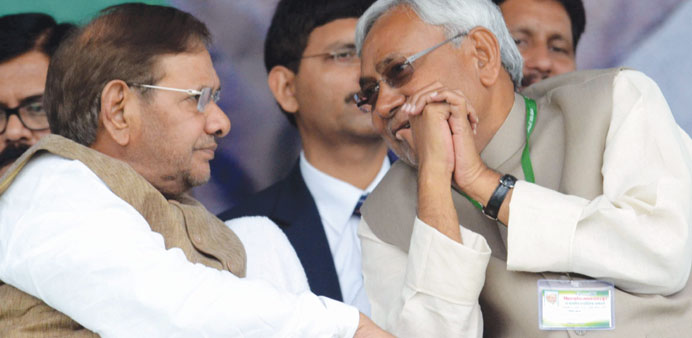IANS/Patna
Bihar Chief Minister Nitish Kumar yesterday announced a one-day fast - and asked people across the state to join him - in protest against the land acquisition amendment bill.
Nitish Kumar asked people to put pressure on the central government to withdraw the bill. He, however, did not announce the date of the hunger strike.
“I appeal to the people to join a one-day fast to protest against the land acquisition amendment bill,” the Janata Dal-United leader said while addressing thousands of party workers at the Gandhi Maidan here.
The chief minister described the land acquisition amendment bill as a “black law,” which was against the interests of farmers.
“I and my party have been opposing this black law and I appeal to party workers and leaders to launch a campaign against it to safeguard farmers’ interests,” he said.
Nitish Kumar targeted Prime Minister Narendra Modi and the ruling Bharatiya Janata Party, saying after getting votes from farmers in the Lok Sabha election, they have forgotten the farmers and left them in the lurch.
“Now, Modi and the BJP are hell bent on snatching the farmers’ lands to benefit industrialists,” he said.
Nitish Kumar said the Modi government should take back the law or face a countrywide protest.
“The land acquisition amendment bill is anti-farmer and anti-people,” he said.
“Without consulting farmers and without wider discussion on the legislation, the bill has been brought,” he said.
In Hyderabad meanwhile, federal Parliamentary Affairs Minister M Venkaiah Naidu appealed to all political parties to help pass the bill in the larger national interest.
He told reporters that the government was ready to consider and discuss any meaningful and constructive suggestions and if necessary, incorporate them.
Naidu said he held talks with leaders of various parties to seek their suggestions. “I hope that all political parties will think in the interest of the country, development and welfare of farmers.”
Naidu, who also holds the urban development portfolio, dismissed criticism by the opposition that the amendment was unilateral or anti-farmer and pointed out that it was drafted keeping in view the views expressed by the states. He said the states sought amendment to overcome the hurdles they are facing in acquiring land for development projects.

Bihar Chief Minister Nitish Kumar and JD(U) chief Sharad Yadav discuss a point during a party rally at the Gandhi Maidan in Patna yesterday.
